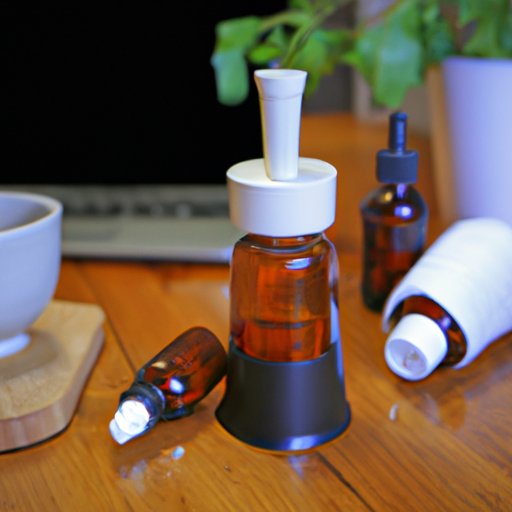Introduction
Sore throats can be a nuisance, painful, and annoying. They can affect anyone at any time and have the potential to derail our plans and ruin our day. Sore throats are usually caused by either viral or bacterial infections, allergies, or tonsillitis. Some common symptoms include pain when swallowing, redness and swelling in the throat, difficulty eating, and a scratchy or dry throat. While a sore throat can be uncomfortable, it’s essential to address this issue promptly to prevent it from developing into something more severe.
Home Remedies
For many, a sore throat can resolve on its own without any intervention. Home remedies can help alleviate symptoms and provide relief. Here are a few things you can do:
Gargling Salt Water
Gargling with salt water several times a day can help rid the throat of bacteria and soothe the pain. Add 1/4 to 1/2 teaspoon of salt to eight ounces of warm water and gargle for 30 seconds before spitting it out. Repeat several times a day.
Drinking Warm Liquids
Drinking warm liquids such as tea, soup, bone broth, or warm water with honey can provide comfort to a sore throat.
Using Honey and Lemon
Adding honey and lemon to your tea or warm water can help soothe a sore throat and provide relief. Honey has antibacterial properties that can fight infections, while acid in lemon can reduce inflammation.
Over-The-Counter Medications
If home remedies do not provide adequate relief, you might consider taking over-the-counter medication. Here are some of the medications you might try:
Throat Lozenges
Throat lozenges are available over-the-counter and are usually a combination of menthol, benzocaine, or eucalyptus. These ingredients can soothe the throat and provide temporary relief.
Pain Relievers
Over-the-counter pain relievers such as acetaminophen or ibuprofen can help relieve pain and reduce inflammation. Please follow the package directions for dosage and instructions.
Sprays
Throat sprays can provide targeted relief to the affected area. They contain ingredients such as benzocaine or phenol, which can numb the throat and provide temporary relief.
Essential Oils
Essential oils can be used for various health benefits, including alleviating sore throat symptoms. Here are a few oils you might try:
Peppermint
Peppermint has a cooling effect on sore throats and can help reduce inflammation. You can diffuse it into the air or apply it topically.
Eucalyptus
Eucalyptus can help break up mucus build-up and has anti-inflammatory properties that can relieve sore throat symptoms. You can diffuse it or add it to boiling water and inhale the steam.
Tea Tree
Tea tree oil has antimicrobial and anti-inflammatory properties that can fight infections and provide relief. It is recommended to combine it with a carrier oil such as coconut oil before applying it topically or inhaling it.
Resting
Resting the throat is essential when it comes to healing a sore throat. Here are a few things to keep in mind:
Importance of Vocal Rest
Avoid shouting or speaking loudly, as this can irritate the throat. Instead, listen to your body and give your throat adequate rest.
Avoiding Strenuous Activities That May Irritate the Throat
Avoid activities such as running, singing, or other exercises that may intensify the symptoms of a sore throat.
Humidifiers
Humidifiers can help alleviate the symptoms of a sore throat by adding moisture to the air. Dry air can exacerbate the pain and prolong the healing process. Using a humidifier can help keep your throat moist and reduce dryness.
Avoiding Irritants
Avoiding irritants that may aggravate the throat can help speed up the healing process and provide relief. Here are a few things to avoid:
Smoking
Smoking is a major irritant that can worsen the symptoms of a sore throat. Avoid smoking or being around secondhand smoke if you have a sore throat.
Pollutants
Avoid being around pollutants such as smoke or chemicals that can irritate the throat.
Dry Air
Dry air can cause a sore throat to become more painful and slow down the healing process. Try to maintain an optimal humidity level in your home or workspace.
Seeking Medical Attention
Sore throats usually heal on their own. However, in some cases, you might need to see a doctor if the symptoms persist or worsen. Here are some scenarios where you should seek medical attention:
When to Seek Medical Attention
If you have a high fever, difficulty breathing, severe pain in the throat, or swelling in the neck, you should seek medical attention. These symptoms can indicate a more severe condition.
Causes for Concern
Strep throat, tonsillitis, and other bacterial infections can lead to significant complications if left untreated. It is crucial to seek medical attention if you suspect a bacterial infection.
Conclusion
Getting rid of a sore throat requires patience and self-care. Incorporating home remedies, over-the-counter medications, and essential oils can provide relief. Resting your throat and avoiding irritants can also help speed up the healing process. If the symptoms persist or worsen, it is essential to seek medical attention. Remember to take care of yourself and listen to your body.
